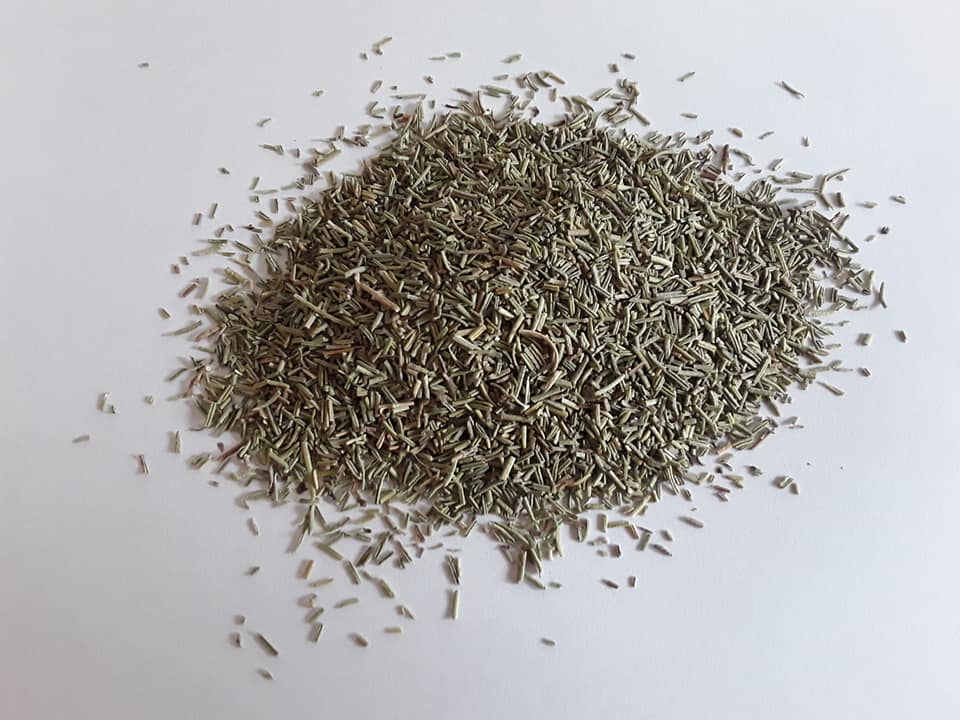
Rosemary for remembrance. Latin Name: Rosmarinus officinalisPlant Family: LamiaceaeOther Names: Compass Weed, Dew of the Sea, Elf Leaf, Sea Dew, Roses of Mary. Rosemary is an evergreen shrubby herb, native to the Mediterranean which grows to a height of 2 metres. The needle like leaves are dark green in colour on the upper surface and have a downy coating making them look greyish green on the underside, they are 2-4cm in length.The 2-lipped flowers are small and blue in colour and grow in clusters in the leaf axils and are approximately 1cm in length.
Rosemary can be used in savoury and sweet recipes, try rosemary and lemon cake or adding some dried rosemary to shortbread with a little grated orange rind. Rosemary compliments chicken, fish and lamb dishes and enhances the flavour of tomato based soups and sauces; it also makes an excellent herbal vinegar and oil for adding to salad dressings and marinades.
Rosemary is a member of the mint family Lamiaceae, along with many other herbs, such as oregano, thyme, basil, and lavender.The herb not only tastes good in culinary dishes, such as rosemary chicken and lamb, but it is also a good source of iron, calcium, and vitamin B-6. The herb has been hailed since ancient times for its medicinal properties. Rosemary was traditionally used to help alleviate muscle pain, improve memory, boost the immune and circulatory system, and promote hair growth.
- Rosemary is a rich source of antioxidants and anti-inflammatory compounds, which play an important role in neutralizing harmful particles called free radicals, which are thought to help boost the immune system and improve blood circulation.
- In Europe, rosemary is often used to help treat indigestion.
- It is thought that the aroma from rosemary can improve a person’s concentration, performance, speed, and accuracy and, to a lesser extent, their mood.
- Scientists have found that rosemary may also be good for your brain. Rosemary contains an ingredient called carnosic acid, which can fight off damage by free radicals in the brain. Rosemary appears to be protective against brain damage and might improve recovery.
- Some studies have suggested that rosemary may significantly help prevent brain aging. The therapeutic ability of rosemary for prevention of Alzheimer’s shows promise, but more studies are needed.
Rosemary is usually safe when taken in low doses. However, extremely large doses can trigger serious side effects, although this is rare. Side effects include:
- vomiting
- spasms
- coma
- pulmonary edema (fluid in the lungs)
- High doses of rosemary may cause miscarriage; therefore it is not advisable for pregnant women to take any supplemental rosemary.
Always thoroughly research any new herb you are thinking of using and if pregnant, breastfeeding or taking prescribed drugs, book an appointment with your healthcare provider.
There are many health benefits of rosemary tea, so it’s a great beverage to be drinking. Steep 2-3 teaspoons of rosemary in 2 cups of just off the boil water for about 5 minutes or longer. The longer you leave it, the stronger the tea will be (Too long will make it bitter). Add a spoon of honey and a slice of lemon if liked. Rosemary blends well with other herbal teas such as lavender or thyme. You can also add some ginger to help with indigestion, or how about some mint or basil for added goodness and a bit of a zing.
